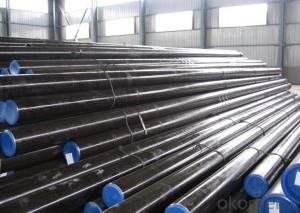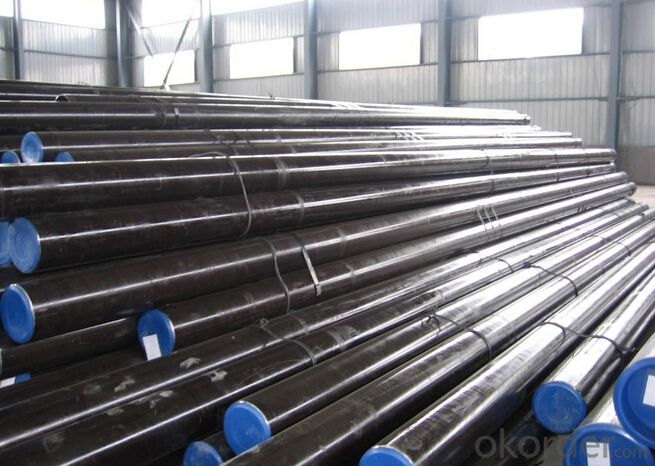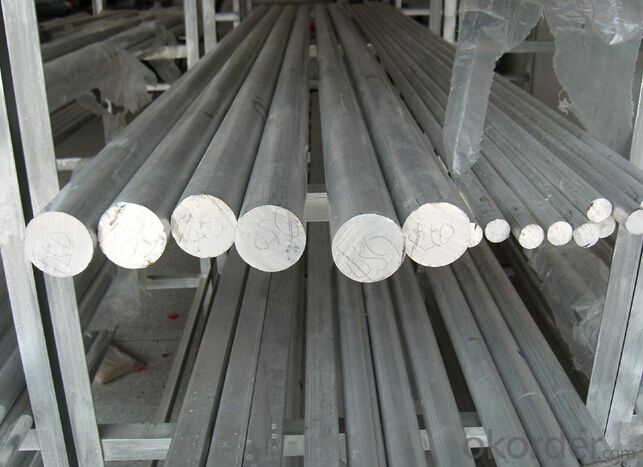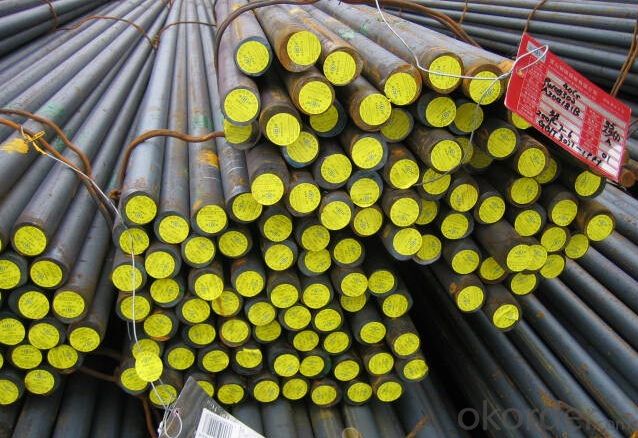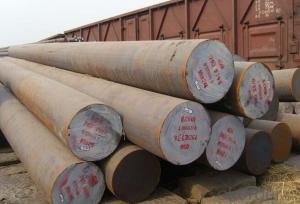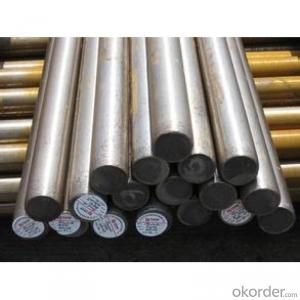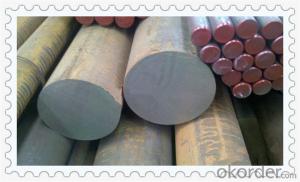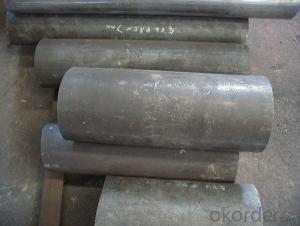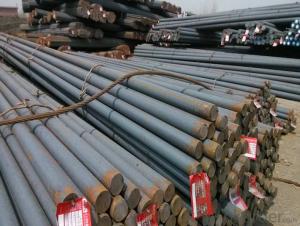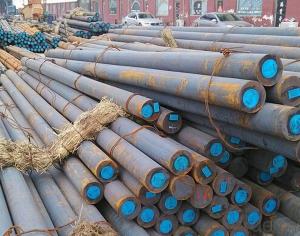SAE 1020 Round Steel Bars Special Steel
- Loading Port:
- China main port
- Payment Terms:
- TT OR LC
- Min Order Qty:
- 30 m.t.
- Supply Capability:
- 10000 m.t./month
OKorder Service Pledge
OKorder Financial Service
You Might Also Like
Specification
Products description details
1. Chemical Composition (%)
C | Si | Mn | Cr | Ni | Cu | P | S |
0.17-0.23 | 0.17-0.37 | 0.35-0.65 | ≤0.25 | ≤0.30 | ≤0.25 | ≤0.035 | ≤0.035 |
2. Mechanical Properties
Tensile strength | Yield strength | Elongation rate | Contractibility rate | Hardness(HB) |
≥410MPa | ≥245MPa | ≥25% | ≥55% | ≤156(without heat treatment) |
3. Standard
GB:20, AISI: 1020, JIS: S20C
4. Specification
Dia: 8mm-480mm or according to your requirements
Length: 1m-12mm or according to your requirements
5. Delivery Condition
Hot rolled, forged, QT heat treatment and normalizing
6. Payment term
T/T, L/C or we can negotiate.
7. Delivery time
20days after the order confirmed
8. Characteristics
1) The strength and hardness of S20C/ 1020/ 20 is higher than that of S15C/ 1015/ 15.
2) Good plasticity and weldability.
3) Good toughness after hot rolling and normalization.
9. Application
High-quality carbon structural steel/S20C/ 1020/ 20
S20C structural carbon steel bar /1020 /20 can be used to be manufactured medium or small carburization or nitrocarburizing parts and press forging parts, such as lever shaft, selector fork of speed changing box, gear, heavy mechanical lever and shackle, etc.
Product show
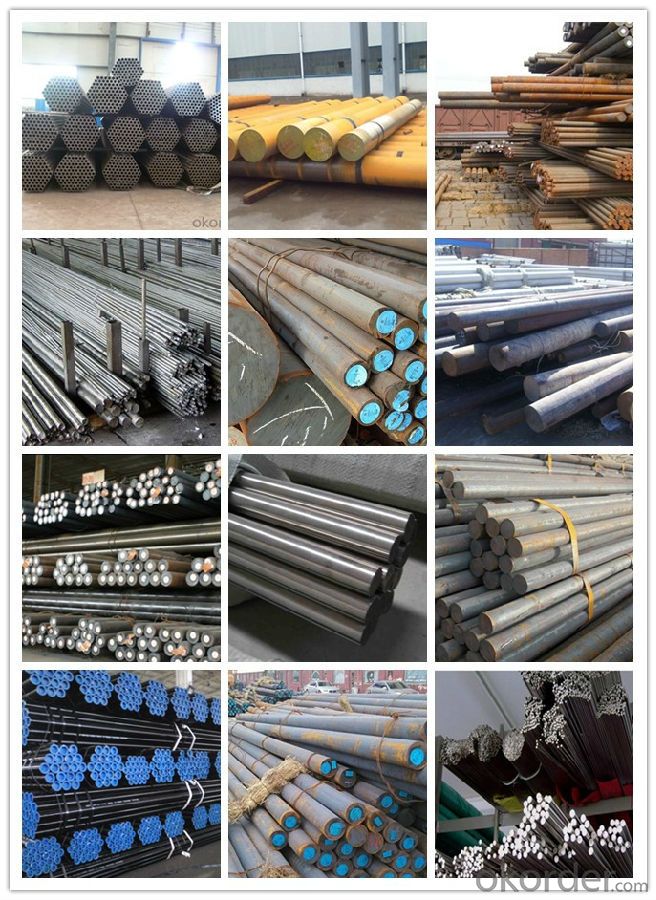
Workshop show
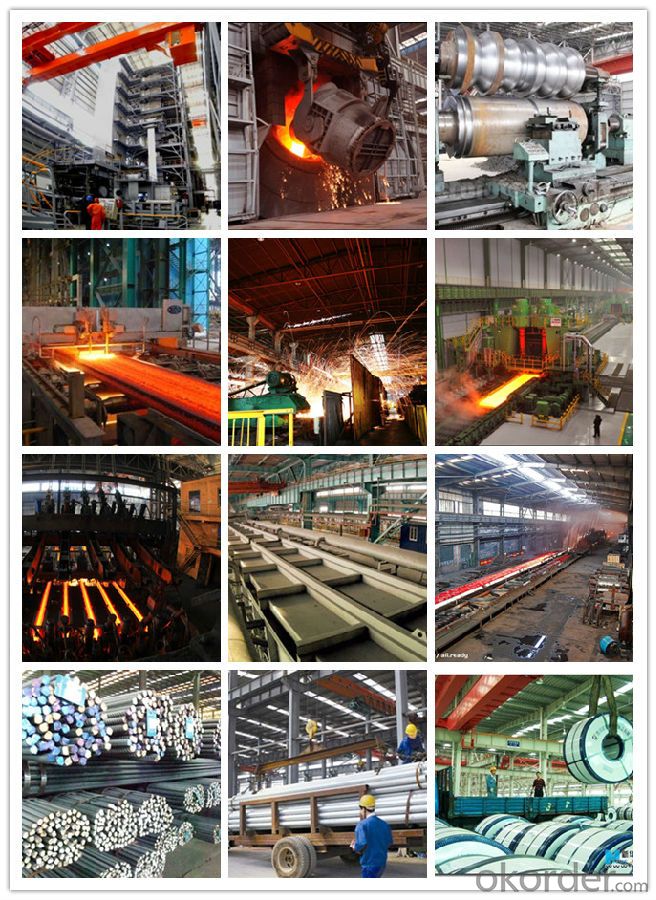
Why choose us?
(1) The leading exporter in China special steel industry.
(2) Large stocks for various sizes, fast delivery date.
(3) Good business relationship with China famous factories.
(4) More than 7 years steel exporting experience.
(5) Good after-sales service guarantee.
- Q: What are the different heat treatment techniques used for special steel?
- Some of the different heat treatment techniques used for special steel include annealing, tempering, quenching, and case hardening. Annealing is a process that involves heating the steel to a specific temperature and then slowly cooling it to relieve stress and improve its ductility. Tempering is done by reheating the steel to a lower temperature after quenching to reduce brittleness and increase toughness. Quenching is a rapid cooling process that involves immersing the steel in a quenching medium like oil or water to achieve high hardness. Case hardening is a technique that involves adding a hard outer layer to the steel by introducing carbon or nitrogen into its surface and then heat treating it to achieve desired properties. These techniques are used to modify the structure and properties of special steel to meet specific application requirements.
- Q: How does special steel contribute to the manufacturing of medical implants?
- The unique properties and characteristics of special steel make it vital in the production of medical implants. These implants need materials that are durable, corrosion-resistant, and biocompatible. Stainless steel, titanium alloys, and cobalt-chromium alloys are special steels that possess these desired qualities, making them ideal for medical implant manufacturing. Stainless steel, for instance, is widely used in the production of medical implants due to its exceptional corrosion resistance and high strength. It finds applications in surgical instruments, orthopedic implants, and dental devices. Stainless steel implants can endure the harsh physiological conditions within the body, ensuring long-term performance and reducing the risk of complications. Titanium alloys, on the other hand, are extensively utilized in medical implant manufacturing. These alloys offer a high strength-to-weight ratio, excellent biocompatibility, and corrosion resistance. Orthopedic surgeries, including joint replacements, as well as dental implants, commonly employ titanium implants. The biocompatible nature of titanium allows for better integration with the surrounding bone, facilitating faster healing and reducing the risk of rejection. Cobalt-chromium alloys are also utilized in the production of medical implants. These alloys possess outstanding mechanical strength, wear resistance, and biocompatibility. Orthopedic surgeries and cardiovascular interventions, such as stents, often make use of cobalt-chromium implants. Their high strength ensures stability and durability, while their biocompatibility minimizes adverse reactions and aids in patient recovery. Overall, special steel provides the necessary qualities for manufacturing medical implants. Whether it is stainless steel, titanium alloys, or cobalt-chromium alloys, these materials contribute to the creation of biocompatible, corrosion-resistant, and durable implants that enhance patients' quality of life and ensure successful medical procedures.
- Q: What are the different stamping grades of special steel?
- Various industries utilize different grades of special steel for stamping purposes. Some commonly used stamping grades are as follows: 1. Low Carbon Steel: This special steel grade is renowned for its exceptional formability and weldability. It finds extensive use in applications necessitating deep drawing or intricate bending. Moreover, low carbon steel is both cost-effective and readily available, making it a highly preferred choice for stamping processes. 2. High Strength Low Alloy (HSLA) Steel: HSLA steel, a type of special steel, incorporates small amounts of alloying elements like copper, nickel, or chromium. This grade offers superior strength and enhanced toughness compared to low carbon steel. It is commonly employed in automotive components, structural parts, and other applications demanding strength and durability. 3. Stainless Steel: Stainless steel is a corrosion-resistant special steel comprising a minimum of 10.5% chromium. It is frequently employed in stamping applications that require resistance against rust, staining, and corrosion. Stainless steel is available in various grades, such as 304, 316, and 430, each offering distinct levels of corrosion resistance and mechanical properties. 4. Tool Steel: Tool steel, a high-quality special steel, is specifically designed for applications necessitating resistance to wear, deformation, and high temperatures. It is commonly used in stamping dies, cutting tools, and other applications where hardness and toughness are vital. Notable tool steel grades include D2, A2, O1, and M2, among others. 5. Electrical Steel: Electrical steel, also known as silicon steel, is a special grade characterized by high magnetic permeability and low electrical conductivity. It finds application in stamping operations requiring efficient magnetic properties, such as transformers, motors, and generators. The aforementioned examples represent only a fraction of the stamping grades available in special steel. The selection of each grade depends on the specific requirements of the application, such as strength, corrosion resistance, magnetic properties, or formability.
- Q: Can special steel be used for making surgical instruments?
- Yes, special steel can be used for making surgical instruments. Special steel, such as stainless steel or high-carbon steel, is preferred for surgical instruments due to its excellent corrosion resistance, durability, and ability to be sterilized. These properties make it suitable for maintaining the hygiene and performance required in surgical settings.
- Q: What are the main characteristics of magnetic steel forgings?
- Magnetic steel forgings exhibit several key characteristics that make them highly desirable in various industries. Firstly, magnetic steel forgings possess excellent magnetic properties, allowing them to be easily magnetized and demagnetized. This property makes them suitable for applications where magnetism is required, such as in electrical motors and generators. Secondly, magnetic steel forgings possess high strength and durability. Due to the forging process, the steel is compressed and shaped, resulting in a dense and uniform microstructure. This enhances the mechanical properties of the steel, including its tensile strength, impact resistance, and fatigue strength. As a result, magnetic steel forgings can withstand heavy loads and harsh operating conditions, making them ideal for use in demanding applications such as automotive components, industrial machinery, and aerospace parts. Another characteristic of magnetic steel forgings is their excellent corrosion resistance. The forging process helps to refine the grain structure of the steel, making it less susceptible to corrosion and oxidation. This property is crucial in industries where components are exposed to corrosive environments or high temperatures, such as marine applications or oil and gas equipment. Furthermore, magnetic steel forgings offer good machinability and weldability. The forging process not only enhances the mechanical properties of the steel but also improves its machinability, allowing it to be easily shaped and modified into intricate designs. Additionally, magnetic steel forgings can be readily welded without compromising their integrity, providing flexibility in manufacturing and assembly processes. Lastly, magnetic steel forgings exhibit excellent dimensional stability. The forging process involves controlled heating and cooling, which helps to minimize dimensional changes and distortions. This ensures that the final product maintains its shape and dimensions, enabling precise fit and compatibility with other components. In summary, the main characteristics of magnetic steel forgings include excellent magnetic properties, high strength and durability, corrosion resistance, good machinability and weldability, and dimensional stability. These characteristics make magnetic steel forgings highly versatile and widely used in various industries, contributing to their overall success and popularity.
- Q: Can special steel be used in the production of surgical implants?
- Yes, special steel can be used in the production of surgical implants. Special steel, such as stainless steel, is often preferred for surgical implants due to its high strength, corrosion resistance, and biocompatibility. It is commonly used for various types of implants, including orthopedic, dental, and cardiovascular implants.
- Q: How does special steel perform in high-stress corrosion cracking environments?
- Special steel performs exceptionally well in high-stress corrosion cracking environments. Due to its unique composition and manufacturing process, special steel exhibits superior resistance to corrosion and cracking under high-stress conditions. This makes it an ideal choice for applications where reliability and durability are crucial, providing a long-lasting solution even in the harshest environments.
- Q: How does special steel contribute to the circular economy?
- Special steel contributes to the circular economy by promoting resource efficiency and reducing waste. It can be recycled multiple times without losing its properties, allowing it to be reused in various applications. This reduces the need for virgin materials, conserves resources, and minimizes the environmental impact of steel production. Additionally, special steel's durability and longevity make it suitable for extended use, further contributing to a more sustainable, circular economy.
- Q: How does special steel contribute to the manufacturing of cutting tools?
- Special steel is a key component in the manufacturing of cutting tools due to its exceptional properties such as high hardness, toughness, and wear resistance. These characteristics enable cutting tools to withstand the rigors of various cutting operations, ensuring longer tool life and improved cutting performance. Furthermore, special steel can be customized to meet specific requirements, making it an ideal choice for manufacturing cutting tools that are used in a wide range of industries, including automotive, aerospace, and manufacturing.
- Q: Can special steel be used for making medical equipment?
- Medical equipment can indeed be made using special steel. Stainless steel, along with other special steels, is frequently utilized in the manufacturing process of medical instruments and equipment due to its exceptional mechanical properties, resistance to corrosion, and biocompatibility. Stainless steel, specifically, possesses remarkable resistance against corrosion, can be easily cleaned and sterilized, and can withstand the demanding conditions encountered during medical procedures. Consequently, it is widely employed in the production of surgical instruments, implants, orthopedic devices, needles, and various other medical equipment. Moreover, special steels can be specifically tailored and engineered to fulfill precise requirements for medical applications, thus guaranteeing the utmost quality and performance.
Send your message to us
SAE 1020 Round Steel Bars Special Steel
- Loading Port:
- China main port
- Payment Terms:
- TT OR LC
- Min Order Qty:
- 30 m.t.
- Supply Capability:
- 10000 m.t./month
OKorder Service Pledge
OKorder Financial Service
Similar products
Hot products
Hot Searches
Related keywords
